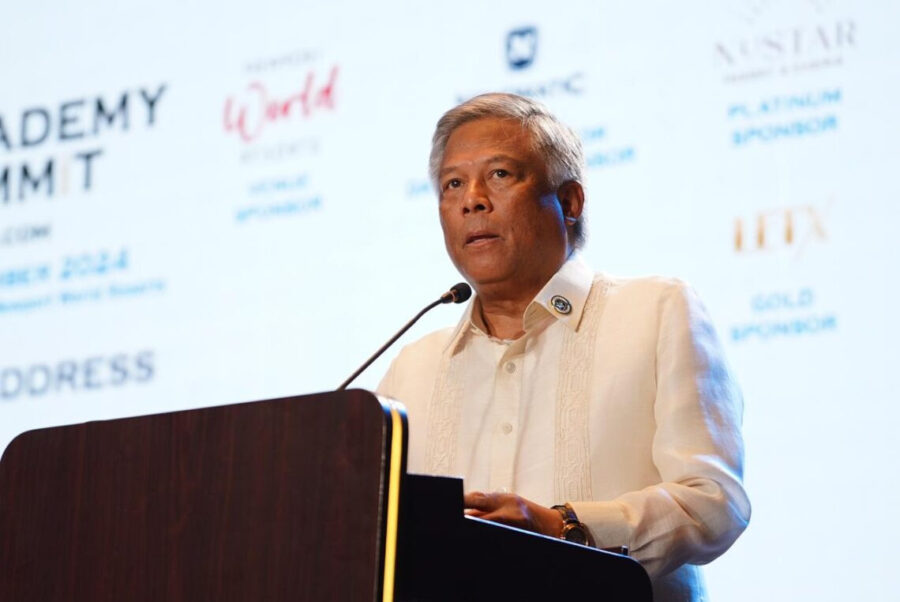PAGCOR revenue up 5.8% and net income surges 49%

Philippine gambling regulator PAGCOR revealed a 49% net income increase from January to September this year, with revenues growing 5.8%.
The agency reported that net income has risen to PHP14.32 billion (US$244 million)1 PHP = 0.0170 USD
2025-11-03Powered by CMG CurrenShift in 2025, compared to PHP9.63 billion (US$164 million)1 PHP = 0.0170 USD
2025-11-03Powered by CMG CurrenShift in 2024.
PAGCOR also revealed that revenues increased to PHP84.09 billion (US$1.4 billion)1 PHP = 0.0170 USD
2025-11-03Powered by CMG CurrenShift, up from PHP79.43 billion (US$1.4 billion)1 PHP = 0.0170 USD
2025-11-03Powered by CMG CurrenShift in the same period last year.
This comes after PAGCOR reported a 49% revenue decrease after e-wallet platforms removed online gambling features in August.
“Our financial performance is a clear reflection of PAGCOR’s renewed focus on governance, digital transformation, as well as sustainable and responsible gaming,” PAGCOR Chairman and CEO Alejandro Tengco, said in a news release. “Every peso that PAGCOR earns goes back to the people through classrooms, health facilities, disaster response programs, and other community projects. Our focus is to sustain this momentum while ensuring that the gaming industry continues to operate responsibly and contribute to national development.”
PAGCOR’s contributions to national-building climbed 11% and reached PHP54.26 billion (US$925 million)1 PHP = 0.0170 USD
2025-11-03Powered by CMG CurrenShift, up from PHP48.88 billion (US$833 million)1 PHP = 0.0170 USD
2025-11-03Powered by CMG CurrenShift the previous year. PHP36.06 billion (US$614 million)1 PHP = 0.0170 USD
2025-11-03Powered by CMG CurrenShift was allocated to the national government as required under Presidential Decree 1869.
The agency paid PHP3.79 billion (US$64.6 million)1 PHP = 0.0170 USD
2025-11-03Powered by CMG CurrenShift in franchise taxes and allocated PHO11 billion to socio-civic projects.
Its mandated beneficiaries, including the Philippine Sports Commission, athletes, and coaches, also received shares of the regulator’s revenues, while other money supported national and energy-related programs.
Charlotte Capewell brings her passion for storytelling and expertise in writing, researching, and the gambling industry to every article she writes. Her specialties include the US gambling industry, regulator legislation, igaming, and more.
Verticals:
Sectors:
Topics:
Dig Deeper
The Backstory
Setting the scene: a regulator under pressure and on the rebound
The Philippines gaming market has shifted quickly over the past year as regulators tightened oversight and operators recalibrated business models around digital payments, product, and profitability. The country’s gambling regulator, PAGCOR, is central to that pivot. Its finances carry both fiscal and political weight because its remittances fund national projects and social programs. The regulator’s latest gains follow a volatile stretch that tested payment rails, enforcement capacity, and market confidence.
The steepest jolt came when mobile wallets cut gambling payment links under guidance from the central bank. In the immediate aftermath, PAGCOR recorded a 40% to 50% income slide after e-wallets removed gambling payment links, a rapid hit that spotlighted how dependent the digital ecosystem had become on frictionless payments. The regulator moved to harden its enforcement playbook, including plans for an AI-driven monitoring tool to identify and help block unlicensed sites in coordination with cybercrime and telecom authorities. Lawmakers also signaled they would scrutinize the social and economic effects of online gambling, a reminder that policy risk in the sector remains high.
That backdrop frames the significance of PAGCOR’s financial recovery. The rebound speaks to the industry’s ability to re-route payments, restore user flows, and lean on domestic operators with entrenched platforms. It also underscores the stakes for the national budget, where PAGCOR’s mandated contributions are a recurring line item and a political barometer for the industry’s license to operate.
Payment shock: from delinking to policy reset
The delinking of e-wallets last year was more than a technical speed bump. It forced a marketwide audit of how players fund accounts, how operators verify flows, and how regulators police the gray edges of online play. PAGCOR’s disclosure of the sudden income fall in the first two weeks after the order revealed the immediate sensitivity of revenue to payment friction. The regulator’s answer—promising real-time detection of illegal sites and support for stricter oversight rather than a ban—aimed to reassure policymakers while preserving a regulated digital channel.
The central bank, for its part, deferred to Congress on whether to tighten rules or consider more sweeping restrictions. That stance kept legislative pressure on the sector and signaled that future stability would depend on visible compliance. In effect, the payments shock became a stress test that accelerated governance upgrades. The industry’s post-shock stabilization and the regulator’s fiscal recovery suggest that alternative rails and onshore compliance have partly offset the earlier disruption.
Operators recalibrate: efficiency, product, and higher-value users
While regulators were shoring up enforcement, operators were rewriting their playbooks. Canadian sportsbook and media firm Rivalry said it rebuilt around efficient acquisition, higher-value customers, and proprietary product. In its latest update, the company reported leaner operations and improving unit economics, with operating expenses down 58% to CA$4 million and net losses cut by 43% year over year. Net revenue per player was estimated to jump 49% in the following quarter versus the first quarter, and the company said per-player revenue was more than triple pre-review levels after a 2024 strategic overhaul.
That narrative—fewer subsidies, more product differentiation, tighter cost control—tracks the broader shift in online gambling after a burst of promotional spending during the pandemic and early legalization waves. It also complements regulators’ push for more responsible gaming features and cleaner transaction trails. As payment rules tightened, the business case for persistent bonus-driven growth thinned. The next phase is about sustainable margins.
Domestic scale players extend their lead
In the Philippines, local champions with large user bases are benefiting from that shift. DigiPlus Interactive, which runs BingoPlus, GameZone, and ArenaPlus, has leaned into scale, content variety, and frequent product refreshes. The company said it delivered PHP4.2 billion in first-quarter net income, up 110% year over year, on a 69% rise in revenue to PHP23.06 billion. It also increased regulatory fees and taxes paid to the state by 28% to PHP1.9 billion for the quarter. The results reflect a stable domestic demand base and the resilience of onshore platforms able to adjust quickly to new compliance norms and payment configurations.
DigiPlus’s scale—BingoPlus alone claims more than 40 million registered players—positions it to weather regulatory tightening while continuing to feed state coffers. The company’s strategy to export its playbook abroad highlights a second-order effect: strong domestic governance and product capabilities can become a foundation for regional expansion. For PAGCOR’s fiscal position, dominant local operators offer a steady bridge between policy enforcement and revenue continuity.
Global context: growth pockets and operational headwinds
The Philippines is not moving in isolation. Global suppliers and operators are navigating uneven growth, compliance demands, and technical risks. Live casino heavyweight Evolution posted €533.8 million in fourth-quarter net revenue, up 12.5%, with total operating revenue up 31.5%. Yet the company flagged flat development in Asia quarter over quarter, citing cyberattacks on video distribution. That warning resonates in Southeast Asia, where illicit sites and infrastructure vulnerabilities complicate market expansion and underscore the need for cross-border coordination on security and licensing.
In North America, MGM Resorts’ digital path shows a different arc. BetMGM recorded US$552 million in net revenue in 2024, up 28%, and expects profitability in 2025 even as adjusted EBITDAR remained negative last year. Management called 2024 a period of investment and momentum rebuilding, with fourth-quarter EBITDA trending toward breakeven on a normalized basis. That trajectory mirrors the sector’s broader pivot from land-grab promotions to disciplined growth, a pattern that is now filtering across Asia as regulators tighten and payment systems evolve.
What to watch next: enforcement, payments, and fiscal stakes
Three threads will shape the next phase. First, enforcement technology and interagency coordination will determine how effectively PAGCOR can curb unlicensed play without blunt bans. The planned AI tool and deeper work with cybercrime and telecom agencies will be the proof points. Second, payment architecture will remain a swing factor. Any further changes by e-wallets or banks could alter user behavior again, with knock-on effects for revenue timing and compliance costs. Third, the fiscal channel matters. PAGCOR’s contributions fund national programs, which makes its earnings politically sensitive and aligns the regulator’s operational stability with public spending priorities.
The industry’s recovery since the payment shock suggests operators and regulators have found new footing. Local scale players are delivering tax flows while global firms weigh Asia-specific risks against growth prospects. If enforcement upgrades take hold and compliant payment rails remain stable, the sector’s shift to profitability and responsible gaming could stick. If not, revenue volatility and policy pressure will return to the foreground.







